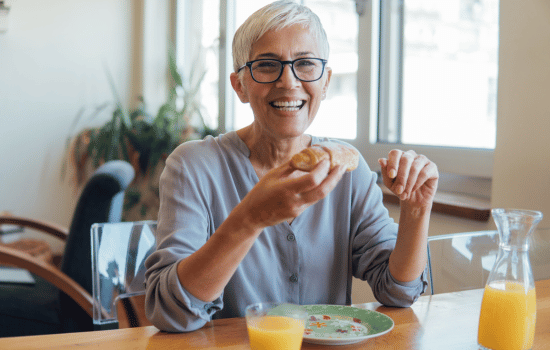Takeaway: Whether you’re new to the concept of intuitive eating or have heard about it for a while, it can be daunting to know where to begin–especially if you’re used to yo-yo dieting or constantly restricting yourself. We get where you’re coming from, and we’re also here to tell you the good news: anyone can learn how to intuitively eat! Here, we share our top tips to help you get started.
Intuitive eating may be a concept you’ve heard of before, but don’t fully understand. If you’re exposed to a lot of fat-phobic, diet culture messaging you may have had it incorrectly explained to you as giving into uncontrollable cravings or going off the rails or justifying “unhealthy” behaviors. I’m here to tell you this is false.
Intuitive eating is the practice of prioritizing listening to your own body over external cues in an effort to improve your overall health. Intuitive eating is driven by listening to your hunger cues and following them. It is a practice rooted in self compassion, gentle nutrition and healthy coping skills. Let’s explore what this means.
Understanding intuitive eating
The term intuitive eating was coined in 1995 by dietitians Evelyn Tribole and Elyse Reach, however the pattern has been around since the 1970’s. It was developed in opposition to diet culture, removing rigid food rules and prioritizing listening to your body’s unique cues to tell you what its unique needs are.
Diets promote following external cues when eating, whereas intuitive eating promotes following internal cues. When it comes to body image, diets promote striving towards a specific body type whereas intuitive eating promotes appreciating your body for what it is. Diets promote exercising to burn calories and punish your body, whereas intuitive eating promotes exercising to celebrate and feel good in your body.
Intuitive eating has maintained its anti diet roots while evolving through different diet culture fads. Intuitive eaters reject diet culture, work towards developing a positive body image, practice active gentle nutrition and engage in movement to feel good rather than lose weight.
Intuitive eating is also not about perfection, it’s about giving yourself grace while trying to do your best to treat yourself with kindness and trust your body.
Benefits of learning how to intuitively eat
Why should people learn how to start intuitive eating? Because the evidence supports it.
Greater body image satisfaction
A 2021 meta analysis showed that those who followed intuitive eating patterns, whether intentionally or unintentionally, were more likely to self report a positive relationship with their body image. Eating intuitively and developing an anti diet mindset allows for space to appreciate, enjoy and respect your body size no matter how it compares to the ideal you’ve idealized in the past.
Greater motivation to exercise
When exercise is a punishment it becomes more mentally challenging to do. When exercise becomes something you do to feel physically well in your body, maintain your long term health, improve your mood and an activity you enjoy it becomes much easier to engage in as part of your regular routine.
Improved psychological health
Studies published in both 2021 and 2020, as well as others, demonstrated that those who followed intuitive eating patterns were less likely to display depressive symptoms, low self-esteem, and psychopathology. The rates of eating disorders or disordered eating behaviors was also significantly lower in the intuitive eaters than non-intuitive eaters. When the toxic relationship with food is addressed it creates space for healing and improved overall well being.
Improved weight stability
Many people who do not follow an intuitive eating pattern (intentional or not) tend to diet regularly. Going on and off diets, or in and out of restrictive periods, often leads to weight fluctuations. Whether extreme or subtle weight fluctuations are associated with poorer mental health, especially in women. Weight fluctuations can lead to emotional distress surrounding body image, body dysmorphia, social anxiety and other negative consequences. The benefits of weight stability are often much greater than weight loss for both physical and mental health.
Decreased food anxiety
When we set up a lot of rules and pressure around food it creates an environment of anxiety whenever we’re eating. We have to deal with food every day, so if we approach it with anxiety that’s a huge portion of our lives that we’re feeling guilt, shame, nervous, etc. Removing this pressure by giving ourselves permission to eat the food we want allows us to remove this anxiety from our day to day lives.
Positive modeling for others
Whether you’re a parent or not your behavior influences those around you. This could be positive or negative. When you express feeling guilty for eating foods you enjoy, it makes others who are eating those foods feel they should feel guilty also. Or, you can demonstrate a positive relationship with food and show others that shame doesn’t have to be a part of the conversation with food.

A beginner’s guide for how to eat intuitively
Lets identify the ten principles of intuitive eating, what they mean and how you can start to implement them into your life.
Reject the diet mentality
The diet mentality is the idea that thinness and weight loss is the ultimate goal when it comes to nutrition choices. It stems from the diet culture surrounding us, and we have to start by simply noticing it. That low-cal what I eat in a day from an influencer in your instagram feed? Start unfollowing and not interacting with those posts. Still checking the calories when choosing what sandwich to grab for lunch? Make the conscious effort to not bring that into the decision process.
Honor your hunger
Part of intuitive eating is doing just that: eating intuitively by honoring your body’s hunger cues. This involves recognizing the feeling of hunger, honoring it by nourishing yourself, and stopping when you feel satisfied. If you’re a chronic dieter this may sound scary or like a feeling you haven’t had in a while because you’ve ignored it so long. An intuitive eating dietitian can help you relearn how to listen to these internal cues and honor them.
Make peace with food
Are certain foods “bad” or “good”? Or maybe “safe” is a word for the foods that fit your restrictive food rules. In order to have a peaceful relationship with food you have to make the choice to no longer assign morality to foods, regardless of what a past diet said about them. This will actually take the power away from these foods and help those intense cravings you’ve previously experienced become more manageable.
Challenge the food police
“I did so good earlier, so I get to eat this piece of bread” isn’t you listening to what your body needs, it’s restrictive eating. This is an area of your intuitive eating journey where you’ll have to actively combat your own thought patterns. Become aware of the points in your day where you inflict diet rules on yourself, acknowledge it, and actively choose a thought pattern that celebrates your physical and mental health.
Discover the satisfaction factor
Yes food is fuel, but it’s also pleasure and enjoyment and should be celebrated as such. When you enjoy eating the piece of chocolate, you both honor your physical hunger and the positive experience that benefits your psychological health. When you choose the low-cal desert that doesn’t taste good, you fail to satisfy your physical hunger and leave yourself emotionally unfulfilled, potentially setting yourself up overeating later.
Feel your fullness
As you’re eating, focus on how you’re feeling. Regardless of what food you’re eating you will eventually feel full. When you’re no longer hungry and start to feel full, this is how your body tells you it’s time to end the meal. The amount of the food on the plate or the portion size on the nutrition label cannot tell you that, only your body can. This is not where you feel guilty for enjoying the eating experience, it’s where you feel like a nourished human being.
Cope with your emotions with kindness
Dealing with emotions is part of the human experience, and emotional eating is when we try to deal with these emotions by eating (or sometimes not eating). The problem is, this doesn’t solve our problems and often adds to our problems by complicating our relationship with food and our body image. Addressing your emotions in a kind, understanding way that honors your mental health is a part of repairing this relationship.
Respect your body
Every body is different, but that can be more challenging to embrace than we often realize. Forcing your body to lose weight it doesn’t need to lose in an attempt to have a body type you don’t have is part of the toxicity of diet culture. You will have to learn to appreciate your body for what it is and the beauty that is inherent in it.
Movement – feel the difference
Just like how intuitive eating involves listening to your internal cues while eating, it also involves listening to your internal cues when it comes to movement. Forcing yourself to engage in extreme exercise to induce weight loss fuels a negative relationship with your body image. Being consistently active and engaging in the exercise that feels enjoyable and good in your body is an important part of healing this relationship.
Honor your health
Healthy eating is not about perfection or elimination or specific food rules. You can practice intuitive eating while pursuing nutrient dense foods that you know will provide your body what you need. In fact, when you stop eating with the goal of losing weight and listen closer to your hunger cues you’ll notice your body steering you towards what you need.

Overcoming common challenges when learning how to intuitively eat
Now that we’ve identified the 10 principles of intuitive eating, let’s discuss how we can navigate the challenges to intuitive eating we’ll likely face. Some of these may sound familiar, some of these may be things you don’t notice.
- Unfollow social media accounts that promote dieting or disordered eating behavior
- Throw out any diet books
- Stop checking the calorie content on labels
- Don’t label foods as “good” or “bad” because food isn’t human, it can’t have morality
- If weighing yourself feels like getting a grade, avoid the scale for a while
- Get rid of clothes you don’t fit into but bought in a size you previously determined was your “goal weight”
- Figure out what your food rules are. Some of them might be obvious, but some of them might be so ingrained in you they feel second nature, so take the time to really think about it.
- Work with an intuitive eating dietitian who can provide an outside perspective and will help you notice more about your thoughts around food.
- Set boundaries with others by side stepping or refusing to engage in conversations about dieting or feeling guilt around food.
- Journal about what your food rules are and what fuels your food choices
- Celebrate how food tastes and not the calorie content
- Wear clothes that feel good on your body regardless of what number is on the label or what the trends are. Clothes are cut to fit bodies, bodies are not cut and adjusted based on trends.
- Tell Aunt Debbie to fuck off when she comments on what your eating (ok, maybe don’t but doesn’t that sound like a dream?)
- Seek out intuitive eating influencers to fill your social media feeds. Not only can they offer tips but the targeted content you’ll start receiving will gear away from the diet mentality.
- Start a food feelings journal. If you’re not comfortable journaling, try this format:
- Address how you’re feeling before a meal
- What level you’re at on the intuitive eating hunger scale before eating
- How you feel while eating (both physically and mentally)
- What level you’re at on the intuitive eating hunger scale after eating
- How you feel emotionally after the meal
- Identify some of your emotional eating triggers

Get support with incorporating intuitive eating principles into your life
If leaving the diet mentality behind and embracing intuitive eating sounds like it could work for you, or if you just feel tired of punishing yourself for meeting your basic human needs, there is hope. There are a few places you can start.
Reach out for help on where to start, specifically a registered dietitian who specializes in intuitive eating and/or a non-diet culture approach to healthy eating. They can be found by googling “intuitive eating dietitian in my area”, through social media and/or through word of mouth if you know people who have improved their relationship with food. For a good example of this, check out the Jill Gulotta Nutrition instagram page and blog posts.
Finding a dietitian is a lot like finding a therapist. You can meet with them first to make sure they’re someone you’d feel comfortable opening up to. Make sure they specialize in intuitive eating and not another specialty. Jill Gulotta Nutrition not only specializes in this approach, but also has multiple dietitians available so you can work with a dietitian who is best equipped to meet your needs.
In the meantime, start by going out of your way to treat yourself with grace and kindness. Actively tell yourself you’re deserving of food, take time to compliment your body, and do anything else that promotes your well being.


